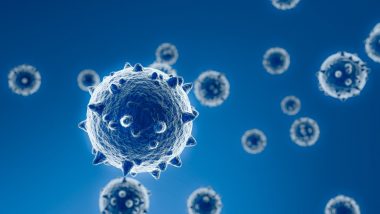Washington, April 17: Results of a new study led by researchers of The Mount Sinai School of Medicine suggest vaccination against COVID-19 remains crucial even in young adults who were previously infected. Although antibodies induced by SARS-CoV-2 infection are largely protective, they do not completely protect against reinfection in young people, as evidenced through a longitudinal, prospective study of more than 3,000 young, healthy members of the US Marines Corps conducted by researchers at the Icahn School of Medicine at Mount Sinai and the Naval Medical Research Center.
The findings were published in the journal The Lancet Respiratory Medicine.
"Our findings indicate that reinfection by SARS-CoV-2 in healthy young adults is common," says Stuart Sealfon, MD, the Sara B. and Seth M. Glickenhaus Professor of Neurology at the Icahn School of Medicine at Mount Sinai and senior author of the paper.
"Despite a prior COVID-19 infection, young people can catch the virus again and may still transmit it to others. This is an important point to know and remember as vaccine rollouts continue. Young people should get the vaccine whenever possible since vaccination is necessary to boost immune responses, prevent reinfection, and reduce transmission." Rare Blood Clot Risk is 100 Times Higher From COVID-19 Infection Than Vaccine: UK Study.
The study, conducted between May and November 2020, revealed that around 10 per cent (19 out of 189) of participants who were previously infected with SARS-CoV-s (seropositive) became reinfected, compared with new infections in 50 per cent (1.079 out of 2,247) of participants who had not been previously infected (seronegative).
While seronegative study participants had a five times greater risk of infection than seropositive participants, the study showed that seropositive people are still at risk of reinfection.
The study population consisted of 3,249 predominantly male, 18-20-year-old Marine recruits who, upon arrival at a Marine-supervised two-week quarantine prior to entering basic training, were assessed for baseline SARS-CoV-2 IgG seropositivity (defined as a 1:150 dilution or greater on receptor binding domain and full-length spike protein enzyme-linked immunosorbent [ELISA] assays.).
The presence of SARS-CoV-2 was assessed by PCR at initiation, middle and end of quarantine. After appropriate exclusions, including participants with a positive PCR during quarantine, the study team performed three bi-weekly PCR tests in both seronegative and seropositive groups once recruits left quarantine and entered basic training.
Recruits who tested positive for a new second COVID-19 infection during the study were isolated and the study team followed up with additional testing. Levels of neutralising antibodies were also taken from subsequently infected seropositive and selected seropositive participants who were not reinfected during the study period.
Of the 2,346 Marines followed long enough for this analysis of reinfection rate, 189 were seropositive and 2,247 were seronegative at the start of the study. Across both groups of recruits, there were 1,098 (45 per cent new infections during the study. Among the seropositive participants, 19 (10 per cent tested positive for a second infection during the study. Of the recruits who were seronegative, 1,079 (48 per cent) became infected during the study.
To understand why these reinfections occurred, the authors studied the reinfected and not infected participants' antibody responses. They found that, among the seropositive group, participants who became reinfected had lower antibody levels against the SARS-CoV-2 virus than those who did not become reinfected.
In addition, in the seropositive group, neutralising antibodies were less common (neutralising antibodies were detected in 45 (83 per cent) of 54 uninfected, and in six (32 per cent) of 19 reinfected participants during the six weeks of observation).
Comparing new infections between seropositive and seronegative participants, the authors found that viral load (the amount of measurable SARS-CoV-2 virus) in reinfected seropositive recruits was on average only 10 times lower than in infected seronegative participants, which could mean that some reinfected individuals could still have a capacity to transmit infection. Is COVID-19 Airborne: New Study Sheds Light on Reasons Why the Coronavirus Can be Airborne.
The authors note that this will need further investigation. In the study, most new COVID-19 cases were asymptomatic -- 84 per cent (16 out of 19 participants) in the seropositive group vs 68 per cent (732 out of 1,079 participants) in the seronegative group -- or had mild symptoms and none were hospitalised.
The authors note some limitations to their study, including that it likely underestimates the risk of reinfection in previously infected individuals because it does not account for people with very low antibody levels following their past infection.
They strongly suggest that even young people with previous SARS-CoV-2 infection be a target of vaccination since efforts must be made to prevent transmission and prevent infection amongst this group.













 Quickly
Quickly


